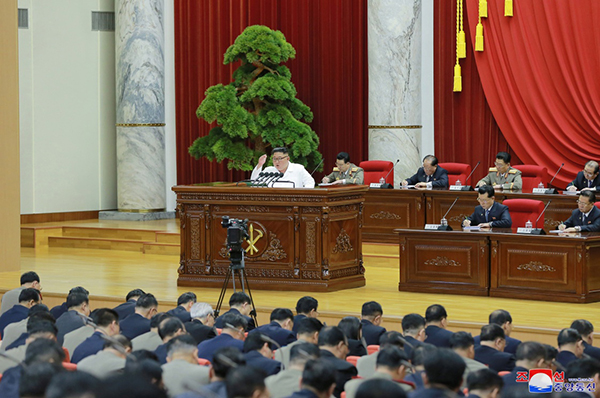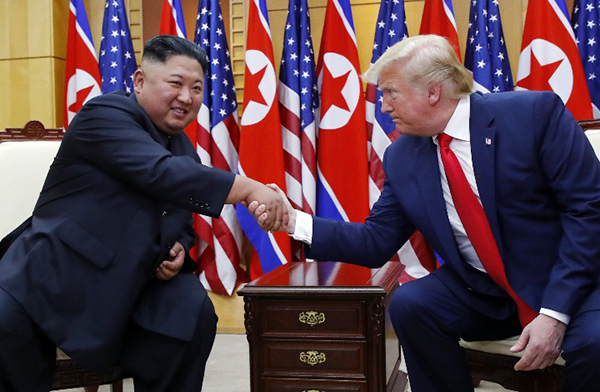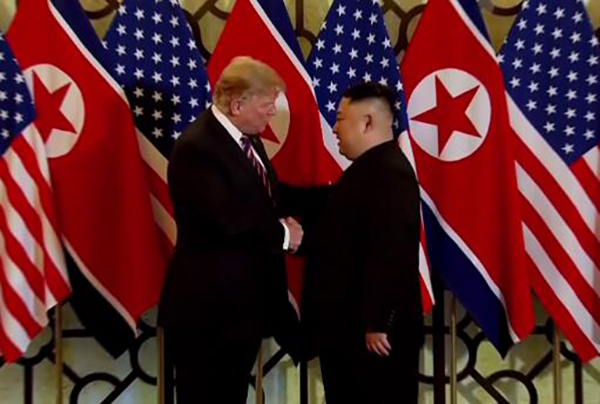The end of this year is the deadline set by the DPRK for the denuclearization negotiations between the DPRK and the United States, but the DPRK-US dialogue has still not made progress. The outside world is worried that both sides will take action because the deadline is approaching, but at the same time, it is also expected that both sides can release positive signals and change the current situation.
The Fifth Plenary Session of the Seventh Central Committee of the Workers’ Party of Korea (WPK) is a top priority in North Korea at present. This is the second time that the WPK has held a plenary session for more than two consecutive days after 29 years. According to a report by Korean Central News Agency on December 31, 2019, the Fifth Plenary Session of the Seventh Central Committee of the Workers’ Party of Korea entered the agenda for the third day on the 30th, and Kim Jong-un, Chairman of the Workers’ Party of Korea, continued to give a report.

This photo provided by Korean Central News Agency on December 31, 2019 shows that Kim Jong-un spoke at the Fifth Plenary Session of the Seventh Central Committee of the Workers’ Party of Korea. The eyes of the outside world focused on the latest statement of the meeting: "Actively take measures to comprehensively safeguard national sovereignty and security" is the Chinese version of Korean Central News Agency’s statement, while literal translation of the original text should be "positive and offensive measures". The word "offensive" has aroused widespread concern. Lee Sang-min, spokesman of South Korea’s Unification Ministry, said on December 30th that regarding the so-called "offensive measures" mentioned by the DPRK at this meeting, the ROK will pay close attention to the contents and resolutions of the follow-up meeting of the DPRK.
At the same time, the United States’ recent tough stance toward the DPRK has not relaxed at all. In an interview with the media on December 29th, White House National Security Adviser O ‘Brien said, "If North Korea takes action, the United States, as a major military and economic power, will take appropriate actions to respond." He added, "There are many choices in the American toolkit".
In addition to the "offensive" expression, we should also pay attention to others.
Both sides seem to have a tendency to wait for opportunities. Liu Tiancong, an associate researcher at the Northeast Asia Institute of China Institute of Contemporary International Relations, said in an interview with The Paper, "It seems that both sides are showing strength, but this is not the case. The two sides still have some tacit understanding. The upper limit of US-DPRK relations depends on the United States, and the lower limit depends on North Korea. Specifically, whether we can talk about it and talk about the results depends on the United States; Whether it will collapse depends on North Korea. "
Wang Junsheng, a researcher at the Asia-Pacific and Global Strategy Institute of the China Academy of Social Sciences, also pointed out in an interview with The Paper that "since 2018, North Korea has made great contributions to easing the situation on the peninsula, but it has not received the expected return from the United States. North Korea assessed that the United States hopes to crush North Korea through pressure, so it said ‘ Active and offensive ’ The key meaning of is to express ‘ We can’t be crushed ’ But in any case, the DPRK still puts constructive and positive words in front, and it is also releasing signals to the outside. "
In fact, it must be noted that the discussion on the military and national security aspects is only a part of this domestic meeting in North Korea, which also involves many other contents, among which the economy is still the most concerned aspect. According to Korean Central News Agency’s report on December 31, 2019, Kim Jong-un emphasized the principle of strengthening party building and enhancing the role of cadres, and spent seven hours making a comprehensive report on the work of the CPC Central Committee, national construction, economic development and military construction of the DPRK.
Korean Central News Agency said that Kim Jong-un "anatomically" comprehensively analyzed a series of problems in the overall national construction, such as current national management and economic construction.
Wang Junsheng believes that the shift of North Korea’s strategic center to economic construction in 2018 is a new thing for North Korea, because in the process of transformation, there may be problems that have not appeared before. The analysis of these problems is an important part of this meeting, and besides, it is necessary to unify thoughts and cognition internally.
Liu Tiancong said that although there are some tough messages in the content of the Fifth Plenary Session, it is prudent and continuous on the whole, and the fields involved are comprehensive and extensive. Most of the content is to emphasize economic development and party building, not just to show strength to the outside world. As an important meeting held at this important stage, the outcome of the Fifth Plenary Session will determine North Korea’s domestic and foreign policies for a long time to come.
The fluctuation of US-DPRK relations stems from the lack of basic trust.
Just before this meeting, the seventh the Central Military Commission (CMC) of the Workers’ Party of Korea just held its third enlarged meeting and decided to further strengthen the overall armed forces of the Korean People’s Army and other countries politically and militarily. This signal is the epitome of the whole December 2019. In the past 30 days, the DPRK and the United States have intensively tested each other with tough tone and practices, including two "major tests" conducted by the DPRK at the West Sea satellite launch site one week apart, and a series of threatening targeted remarks made by the US from President Trump to Secretary of Defense Esper to Chairman of the Joint Chiefs of Staff, Mark Millie.

On December 16, 2019, US Special Representative for North Korea Policy Stephen Beagan was in Seoul. In sharp contrast to the Xinhua News Agency, the State Council’s special representative for North Korea policy, Beagan, visited South Korea, Japan and China in mid-December 2019, and finally failed. Previously, the contact with North Korean officials was finally dashed. In fact, this can be foreseen as early as an expression by Myong gil Kim, the visiting ambassador of the DPRK Foreign Ministry in November, when he said, "If the United States only holds talks to successfully get through the end of the year, then North Korea is not interested in such talks."
In Singapore in June 2018, US President Trump and North Korean leader Kim Jong-un reached a four-point consensus in the joint statement signed jointly, and the outside world generally had more positive expectations for the DPRK-US relations. However, in 2019, the DPRK-US relations have been fluctuating repeatedly. First, from the Hanoi summit in February, Trump crossed the "38th parallel" and became the first incumbent US president to enter North Korea. Then, in October, the Swedish working talks between the two sides ended without results, and the DPRK-US relations were full of twists and turns like a roller coaster.

On June 30, 2019, US President Trump (right) and North Korean leader Kim Jong-un held talks at the "Freedom House" on the Korean side of Panmunjom. Xinhua News Agency data map Liu Tiancong believes that the fundamental reason for the intermittent relationship between the United States and the DPRK lies in: on the one hand, there are fundamental differences between the two sides on the issue of denuclearization that are difficult to reconcile; On the other hand, the two countries, mainly the United States, need to maintain the basic atmosphere of dialogue in order to obtain political interests. For more than a year, even if the relationship between the United States and North Korea was warm for a while, it was just a political need, which was difficult to last and even more difficult to go deep.
"There is a lack of the most basic trust between the DPRK and the United States." Wang Junsheng believes that this is the core issue that caused this situation. "The DPRK and the United States have reached a consensus on the direction of solving the Korean Peninsula issue, but this year’s issue is how to implement it, in other words, who will take the first step. North Korea is unwilling to declare its nuclear weapons program first and abandon its nuclear program first, fearing that the United States will strike, while the United States is worried that North Korea will renege after lifting sanctions. " Wang Junsheng pointed out that this situation not only requires the persistence of both sides, but also urgently requires the intervention of a third party.
The international community actively promotesword
At the same time, all parties in the international community hope that the tense fire of DPRK-US relations in 2019 will spread to the upcoming New Year as little as possible.
On December 30th, the UN Security Council held an informal meeting to discuss the second round of the proposal put forward by China and the Russian Federation to partially lift sanctions against North Korea. Although the final result of the proposal is unknown, and there are many predictions that the attitude of the United States will not be reversed at all, it is an attempt to solve the peninsula problem politically in any case. Chinese Foreign Ministry spokeswoman Geng Shuang said at a regular press conference on the 31st that at this meeting, all parties further exchanged views on the draft resolution and were willing to keep in touch with each other on the next step of negotiation.
On December 24th, when asked about the relevant issues, the spokesman of the UN Secretary-General said, "Our message to North Korean leaders is to commit to peace and stability on the peninsula and resume working-level dialogue with the United States."
At the previous meeting of leaders of China, Japan and South Korea, the three countries also reiterated that denuclearization of the peninsula and lasting peace in Northeast Asia are the common goal of the three parties, and dialogue and consultation are the only effective way to solve the peninsula problem. They also said that they should strengthen communication and coordination among the three countries on peninsula affairs and play a constructive role in realizing denuclearization of the peninsula and long-term stability in Northeast Asia.
Late at night on December 21st, Japanese Prime Minister Shinzo Abe also said after a telephone conversation with US President Trump that Japan will strive to promote North Korea’s efforts to achieve denuclearization of the peninsula through peaceful dialogue, and Japan fully supports the US-DPRK negotiations on denuclearization of the peninsula.

At 6: 30 pm local time on February 27, 2019, the second US-DPRK summit was unveiled at Sofitel Legend Hotel in Hanoi, Vietnam. Under the eyes of everyone, US President Trump and North Korean leader Kim Jong-un walked into the venue and smiled and shook hands. Liu Tiancong predicted that according to the current situation, North Korea is not expected to do anything too outrageous, such as resuming nuclear tests. North Korea may show toughness by launching short-and medium-range land-based missiles, submarine-launched missiles and even satellites, but these will not touch the red line of the United States and will not lead to the collapse of the US-DPRK dialogue. As long as North Korea does not cross the line, Trump will not take the initiative to worsen US-DPRK relations and find trouble for himself before the election. Therefore, it is quite possible for the situation on the peninsula to maintain the current situation and even further resume the dialogue between the United States and the DPRK.
Wang Junsheng believes that all parties should strive for the common denominator as much as possible, try to continue discussing the reversible clauses of resolutions concerning the DPRK within the framework of the UN Security Council, and work out a clear road map for lifting sanctions, and then try to deal with the contents related to the humanitarian field first.